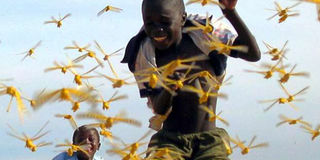It’s time to elect bees and forget locusts

Senegalese children run as locusts spread in the capital Dakar September 1, 2004. PHOTO | REUTERS
What you need to know:
- Locusts have, from time to time, devastated parts of Africa so that the fight against them has become an international affair — rather like the fight against terrorism.
- A locust can eat its weight in plants each day. I wonder how much a corrupt leader can “eat” in a day? A month? Five years? The appetite to “eat” seems to increase in quantum leaps. What a disease! The more one eats, the hungrier one gets.
- If you are a leader who is working as hard as a worker bee, you will want to give way to the younger generation.
What do locusts and bees have to do with leadership? Rather a lot, it turns out.
According to National Geographic, a plague of locusts is a devastating natural disaster. History bears this out. In Old Testament days, locusts covered the surface of the land so that it was black, and ate until nothing green was left in all of Egypt. Scientists have proven that the biblical plagues of Egypt did happen, though they prefer to attribute them to “natural causes”.
Locusts have, from time to time, devastated parts of Africa so that the fight against them has become an international affair — rather like the fight against terrorism.
Desert locusts are normally shy, solitary insects, but when they get together, watch out! They become different creatures altogether, even changing colour from brown to yellow. Their character changes too, from shy to aggressive, and they develop a travel itch. Swarms can migrate more than 130 kilometres in a day — the distance between Nairobi and Embu. Part of an average swarm can eat as much as about 10 elephants, 25 camels, or 2,500 people in a day!
No wonder they are referred to as “devourers” and “destroyers”. Locusts clearly have a devastating and impoverishing effect.
There is no hiding the devastation caused by a plague of locusts. Similarly, there is no hiding the devastation caused by a corrupt leader.
If whole industries diminish or disappear, if roads that once existed are now merely large craters where maize can be planted (and grow), if you are well fed while the people you purport to lead languish in poverty, you may need to hold an honest conversation with yourself regarding your leadership role.
A locust can eat its weight in plants each day. I wonder how much a corrupt leader can “eat” in a day? A month? Five years? The appetite to “eat” seems to increase in quantum leaps. What a disease! The more one eats, the hungrier one gets.
Honey bees, like locusts, have been around for millions of years. But that is where their similarity ends. Did you know that a bee is the only insect that produces food which human beings can eat?
POLLINATE FOOD CROPS
Honey is both medicinal and nutritional. Some medical practitioners are even using bee venom to treat pain, arthritis and multiple sclerosis. Besides producing honey, beeswax, propolis and venom, bees also pollinate our food crops. Without them we would have no vegetables, no fruits.
A single worker bee lives for only six weeks, but it is six weeks filled with hard work. A worker bee will visit up to 100 flowers on each trip it makes and return to the hive carrying half its weight in pollen as well as the nectar it brings home in its nectar pouch.
In its lifetime, the worker bee will produce just one-twelfth of a teaspoon of honey — but that is all that is required from this one bee, which is just one of 60,000 worker bees in a hive.
If you are a leader, we hope you are working as hard as a worker bee. Where is the honey you have produced? A new industry in your county? A clean marketplace? Improved maternal and newborn health? (First Lady Margaret Kenyatta is clearly showing herself to be a worker bee in this area).
If you are a leader who is working as hard as a worker bee, you will want to give way to the younger generation. You ought to have accomplished what you set out to do and you ought to be tired. If you must hang on to a position for 30 years, you are no longer a worker bee but a queen bee — in power, not in service. Obviously, unlike bees, human beings continue to be useful and valuable into old age. Older people (mostly) make up in wisdom what they may lack in energy.
What a difference it would make to Kenya if in 2017 we determine to elect a swarm of bees rather than a swarm of locusts! Where a locust is a devourer, a bee is a producer; where a locust is a devastator, a bee is a restorer.
A final note to you, dear reader — leadership has become synonymous with politics. What a shame if we forget that each one of us is a leader. Parents are leaders, employers are leaders, supervisors at the workplace are leaders, and so are directors in a company’s board. Pastors at our places of worship, policemen and teachers too are leaders.
So, leader, are you a locust — a devourer and destroyer — or are you a bee — a producer? How Kenya cries out for the latter!
Mr Waweru is the CEO, WordAlive Publishers. [email protected].




